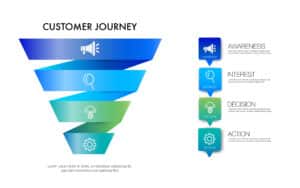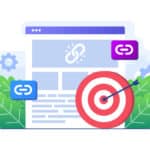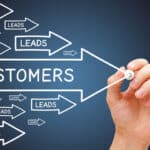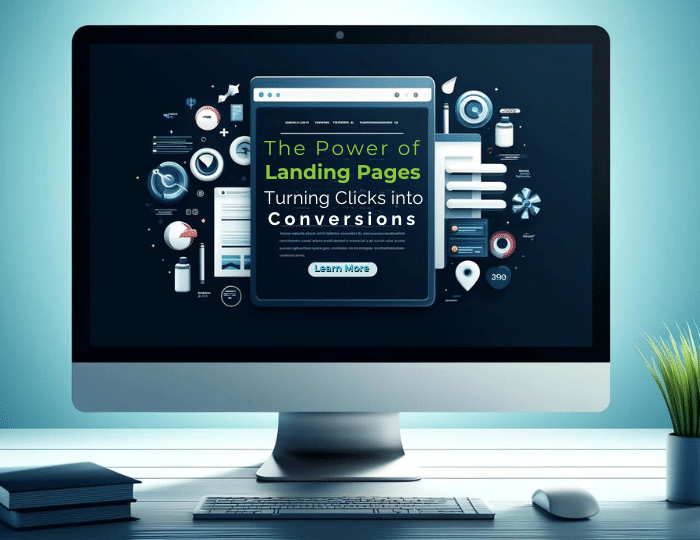The marketing funnel is a fundamental concept in digital marketing, representing the journey a customer takes from first discovering your brand to making a purchase and beyond. It’s a visual metaphor that breaks down this journey into stages, allowing businesses to understand how to interact with potential customers at each point.
By creating and optimizing a marketing funnel, businesses can guide customers through a structured path, moving them from awareness to action with targeted content and strategies that meet their needs at every stage. In this post, we’ll break down the marketing funnel and explain how it works to drive conversions and foster customer loyalty.
The Stages of the Marketing Funnel
A traditional marketing funnel consists of several stages, each representing a different level of customer engagement:
1. Awareness (Top of the Funnel – TOFU)

At the top of the funnel, potential customers become aware of your brand for the first time. They may encounter your business through social media, a Google search, or a piece of content shared by a friend. The key focus at this stage is generating interest and introducing your brand to as wide an audience as possible.
Strategies at this stage often include SEO, social media marketing, and content marketing (e.g., blogs, videos, infographics) that focus on educating and entertaining your audience without a hard sales pitch.
2. Consideration (Middle of the Funnel – MOFU)
As potential customers move down the funnel, they enter the consideration stage. At this point, they are aware of their problem or need and are actively seeking solutions. Here, your goal is to position your product or service as the best solution for their needs.
This stage often involves content like case studies, product comparisons, email marketing, and webinars that help nurture leads by providing deeper insights into your offerings.
3. Decision (Bottom of the Funnel – BOFU)
At the bottom of the funnel, potential customers are ready to make a decision. This is where the final push happens, and they are evaluating whether to purchase your product or service. It’s essential to provide them with the confidence and motivation to complete the purchase.
Tactics at this stage often include offering free trials, product demos, customer testimonials, and special promotions to incentivize the purchase. Strong calls to action (CTAs) are crucial here to convert leads into customers.
Why the Marketing Funnel is Important
The marketing funnel helps businesses visualize the customer journey and ensures that marketing efforts are aligned with the customer’s mindset at every stage. Without a clear understanding of how people move from awareness to conversion, marketing can become inefficient and disconnected.
A well-structured funnel helps marketers create personalized, effective messaging that speaks directly to the customer’s needs and concerns. This targeted approach not only leads to more conversions but also fosters long-term relationships with customers by building trust and providing value at every step.
How to Optimize Your Marketing Funnel
- Analyze Customer Behavior
Use data to understand how potential customers interact with your brand at each stage of the funnel. Tools like Google Analytics can help track where visitors are dropping off and which content or strategies are most effective at moving them down the funnel. - Refine Your Messaging for Each Stage
Tailor your messaging and content to the specific needs of your audience at each stage of the funnel. For instance, awareness stage content should focus on education and brand awareness, while decision stage content should highlight product benefits and address concerns to close the sale. - Leverage Automation and Email Campaigns
Automated email marketing can be highly effective in nurturing leads through the funnel. By sending personalized, relevant content based on where the lead is in the funnel, you can keep your brand top-of-mind and guide them toward making a purchase decision. - Measure and Adjust
The marketing funnel is not a static structure. Regularly reviewing its performance and making adjustments based on data will help you improve conversion rates. A/B testing different content, CTAs, or promotions can yield valuable insights into what works best at each stage.
Unlock the Full Potential of Your Marketing Funnel
Incorporating a well-optimized marketing funnel into your business strategy is essential for driving customer engagement and increasing conversions. By understanding and targeting each stage of the funnel with the right content and approach, businesses can create a seamless customer journey that leads to long-term success.
How Sprout Media Lab Can Help Your Business
Building and optimizing a marketing funnel can be a complex process, but partnering with a digital marketing agency like Sprout Media Lab can simplify the task. With years of expertise in SEO, content marketing, and lead nurturing strategies, Sprout Media Lab can help you craft a funnel that works for your business.
If you’re ready to grow your brand and increase conversions through a powerful marketing funnel, contact Sprout Media Lab at (800) 617-6975 today.












